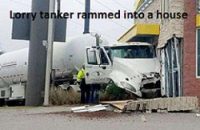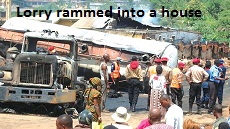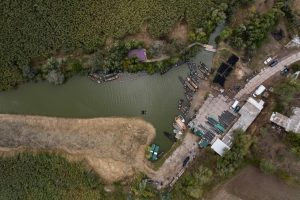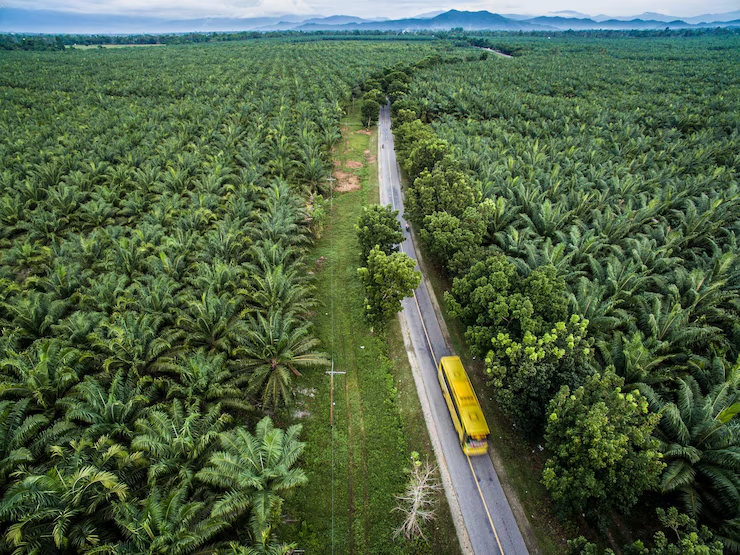How do I claim home impact damage by a vehicle? I drove along the hot, sultry tar road on a quiet afternoon. It was surrounded by a ring of palm oil trees, I slowly made my way into the Felda Sg Sayong settlement, trailing behind a palm oil tanker. To my dismay, the winding road took a sudden turn, and the tanker driver lost control of the steering. The vehicle veered off course and rammed into a settlement house on the lower ground.

It was a terrifying experience. Fortunately, no one was injured when the palm oil tanker crashed into the semi-brick wooden house. Accidents like these, especially in areas with varying road elevations, can have serious consequences.

The scenario —where a truck lost control, rammed through a divider, and crashed into a house—is an unfortunate but not uncommon occurrence in regions where heavy vehicles frequently travel near residential areas. In this case, it’s lucky that the elder couple who lived in the house were unharmed, though the destruction of part of their home must have been quite distressing.
How do I claim home impact damage by a vehicle?
These incidents highlight the importance of road safety measures, particularly in areas where homes are located close to busy roads or where roads are at different elevations. They also emphasize the need for proper maintenance and caution when transporting heavy goods like palm oil, which is common in areas with palm oil plantations.
After the palm oil tanker crashed into the house, the priority was to check on the condition of the driver. Neighbours and bystanders rushed to the scene, finding the driver visibly shaken but conscious. He was carefully helped out of the cab of the tanker, showing signs of shock but, thankfully,

without any serious injuries.
One of the bystanders immediately called the police and emergency services to report the accident. While waiting for them to arrive, some of the onlookers provided first aid to the driver, ensuring he remained calm and seated away from the vehicle, as there was concern about potential fuel or oil leaks.
The police arrived swiftly and began securing the area. They took statements from the driver, the elderly couple, and witnesses who had seen the accident occur. The driver was later taken to the hospital for a thorough check-up, while the police initiated an investigation to determine the cause of the accident, including whether mechanical failure, road conditions, or driver error played a role.
The police also coordinated with emergency response teams to ensure that the scene was safe and that no hazardous materials from the tanker posed further risks to the community. The community was advised to keep a safe distance while the authorities worked to clear the wreckage and investigate the incident.
How do I claim home impact damage by a vehicle?
I provided practical advice to the elderly couple by suggesting they claim the damage under their house fire insurance’s impact damage clause or extension, which would likely be a more efficient process than dealing with the truck’s insurance company. This approach would allow them to avoid the lengthy and complex process of claiming through the truck’s insurer, which could involve extensive back-and-forth and delays.
Involving a lawyer who takes a 25% cut from the claim’s quantum is a smart backup plan if the insurance claim is complicated or disputed. The lawyer’s expertise could streamline the process, ensuring that the couple receives the compensation they deserve while reducing the stress and time involved in handling the claim themselves.
This strategy focuses on leveraging existing coverage and expert help, making the resolution process as smooth and swift as possible for the couple.

Filing an impact damage claim directly with your fire insurance provider has several advantages over pursuing a liability claim against a truck’s insurance, especially when a lawyer is involved. Here are the key benefits:
1. Faster Resolution
- Streamlined Process: Filing a claim under your fire insurance policy for impact damage is usually a straightforward process. The insurance company already has a relationship with you, making it easier to initiate and process the claim.
- Avoid Legal Delays: When you pursue a liability claim against the truck’s insurer, the process can be slow, particularly if the case involves legal disputes or requires going to court. This can result in significant delays before you receive any compensation.
2. Less Time-Consuming
- Simplified Communication: Dealing with your insurer means fewer parties are involved. You only need to communicate with your insurance company and possibly an adjuster, rather than multiple parties, including the truck’s insurance company, lawyers, and potentially the court.
- No Court Involvement: Impact damage claims typically don’t require you to go to court, which saves you time and the stress of legal proceedings.
3. Lower Costs
- No Legal Fees: By claiming under your policy, you avoid the potentially exorbitant legal fees associated with hiring a lawyer to pursue a liability claim. Lawyers often charge a percentage of the settlement, and legal battles can be costly.
- Fixed Deductible: The only out-of-pocket expense you typically face is your policy’s deductible, which is usually predictable and manageable compared to the uncertain and potentially high costs of legal fees.
4. Greater Control and Certainty
- Predictable Process: The process of claiming impact damage under your fire insurance is generally well-defined and predictable. You know the steps involved and can manage the process directly with your insurer.
- Quicker Repair of Damages: Because the claim process is faster, you can begin repairs on your property sooner, minimizing disruption to your life and reducing the potential for further damage.
5. Avoiding Disputes
- Fewer Disputes: When dealing with your own insurance company, disputes over liability and the extent of damages are less likely. In contrast, the truck’s insurer might contest the claim, leading to prolonged negotiations or litigation.
- Reduced Stress: Handling a claim directly with your insurer, especially when you have clear coverage, can be much less stressful than engaging in a legal battle over liability.
In summary, claiming impact damage directly through your fire insurance is typically faster, less expensive, and less stressful than pursuing a liability claim against the truck’s insurer. It allows you to avoid legal complexities and focus on repairing the damage and returning to normal as quickly as possible.
.

